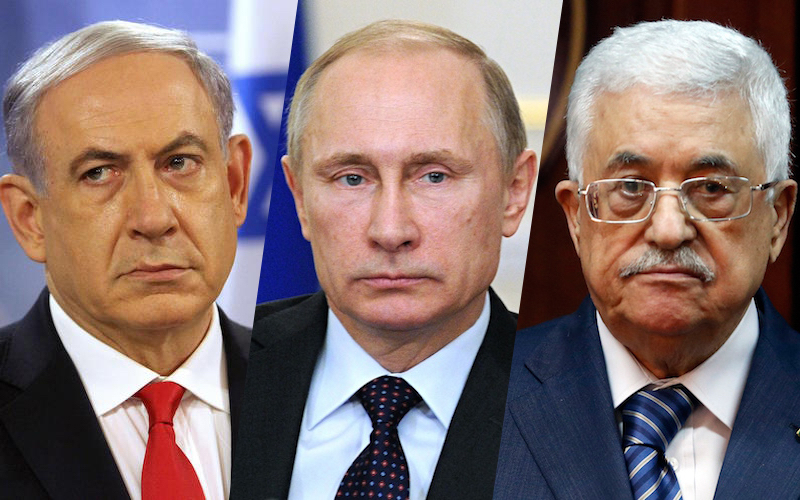
Sideline Russia From Israeli-Palestinian Peace
Those who bemoan the United States constantly trying to jumpstart the peace process and force the two parties to the table finally have some cause for celebration. There are plans in the works for the Israelis and Palestinians to sit down across from each other at a peace conference overseen by a third party, but it is not President Obama or Secretary of State Kerry who will be serving as host. Instead, it will be Vladimir Putin playing international peacemaker, amidst speculation in the Israeli press that Prime Minister Netanyahu and President Abbas will meet in Moscow in October. If this meeting does indeed end up taking place, it is highly unlikely that anything will come of it. But it will still be a big deal if it happens, more for what it says about the U.S. than about any movement on the Israeli-Palestinian front.
Any peace negotiation between Netanyahu and Abbas stands little chance of success. The personal histories of distrust and even animosity between the two men are well known. Abbas is still reportedly keeping to his self-defeating demand of preconditions – a complete settlement freeze and a final status timetable – before sitting down with Netanyahu, while Netanyahu rejects making direct talks contingent on Israel agreeing to concessions ahead of time. Neither the Israelis nor the Palestinians seem prepared to rock the boat with any big moves in the near future, particularly with the American presidential election and Palestinian municipal elections in the fall creating an atmosphere of uncertainty. So for a variety of reasons, the potential October meeting will amount to nothing.
The fact that it is destined to go nowhere, however, is not the point. The point is that Netanyahu and Abbas might convene under the auspices of a world leader who is not American, and that is a mightily important – and from the American perspective, an unwelcome – development. The U.S. is not the only international player when it comes to Israeli-Palestinian or Israeli-Arab peacemaking. The U.N. has of course been an influential player in shaping the direction of negotiations between Israelis and Palestinians due to Security Council resolutions of various stripes. The Quartet is comprised of Russia, the European Union, and the United Nations in addition to the U.S., and other states – most recently France and Egypt – have tried to mediate between the parties outside of American guidance. But it is rare for Israeli and Palestinian leaders to agree to sit down with a third party world leader who isn’t American, and the fact that this might now happen not only sets a precedent for the future, but is a marker of the erosion of American influence with both parties.
Political scientists talk about the role that the U.S. plays as the global hegemon, expending its own capital and resources to do things like ensuring the freedom of international shipping lanes and maintaining the post-WWII institutions of global security architecture, but no global hegemon acts out of a sense of unencumbered altruism. The U.S. gets benefits from acting as the adult responsible for this part of the solar system. Sometimes those benefits are tangible and easily measured, such as the dollar being the world’s reserve currency or the NATO Supreme Allied Commander Europe always being an American. Other times those benefits are reputational and signal that the U.S. gets to shape events by dint of it being the world’s only superpower. Convening Israeli and Palestinian leaders and mediating the conflict falls under this latter category, and that Russia wants to now horn in on the traditional American role – and that Netanyahu and Abbas might be complicit in assisting Russian encroachment – will damage the U.S. in a way that cannot be quantified, but it will be damaging nonetheless.
Shepherding Israeli-Palestinian negotiations is not a matter of solving all of the U.S.’s problems in the region. The conflict is not the primary cause of anti-Americanism, of global terrorism, or of regional instability. U.S. involvement, however, projects American power without bombs and guns, because it sends a signal that the U.S. is indispensable; not only is the U.S. the sole actor capable of getting the two sides to talk, but it is the sole actor capable of guaranteeing that an agreement lasts. The American financial commitment to Israel and Egypt emanating from the 1979 Camp David Accords shows how this works in practice, where the U.S. guarantees the peace through aid but also through an unspoken admonition that breaking the peace will come with consequences for the offending party’s relationship with the U.S. as well. The Israeli-Palestinian conflict is not the most important conflict on Earth, but it is the most high profile one, and that is why overseeing it matters to America’s reputation and to American power and credibility.
The still-in-the-works Putin summit presents a dilemma for American policymakers, since there are no good options. Convening Netanyahu and Abbas for talks that are doomed to fail doesn’t do much good, and failed talks almost always create more chaos on the ground. On the other hand, sitting back and ceding this ground to Russia also does no good for the reasons outlined above. While Israeli-Palestinian peace would be a great development, Israeli-Palestinian peace talks without primary American involvement would be less so. This may be one instance where the U.S. should be rooting for Netanyahu and Abbas to remain in character, guaranteeing that rumors of a meeting remain just that.
This article was originally posted in Ottomans and Zionists.
